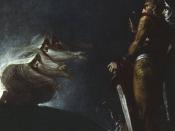Second Witch: "When the hurlyburly's done, / When the battle's lost and won."
On a heath the Three Witches decide to meet again after a battle being fought nearby. Thunder, storms and the desolate heath, paint a gloomy picture, setting the tone of this play and defining an imagery of nature at war with itself, a recurring theme in this play...
The play begins upon a heath. Thunder and lighting rake the air. Three Witches ask themselves when they shall next meet, deciding that it will be "When the hurlyburly's done, / When the battle's lost and won" (Line 4). This will be later in the day at "the set of sun" (Line 5) upon a heath again where they will meet Macbeth. Together the Three Witches cry, "Fair is foul, and foul is fair: / Hover through the fog and filthy air" (Line 11).
Act I. Scene II.
- A Camp near Forres.
A bleeding Sergeant: "For brave Macbeth,-well he deserves that name...."
Macbeth is introduced to us as the brave man who led King Duncan's forces to victory against the traitorous Thane of Cawdor, Macdonwald and The King of Norway, in a battle that could have gone either way were it not for Macbeth's leadership. We learn that Macbeth killed Macdonwald himself in battle. King Duncan, overjoyed, decides to make Macbeth his new Thane of Cawdor. The previous Thane of Cawdor will be executed.
King Duncan, his sons Malcolm and Donalbain, and noblemen Lennox enter, meeting with a bleeding Sergeant. He speaks to the King of a battle between the King's forces and those of the traitorous Macdonwald.
Victory was not assured, but then Macbeth entered the fray, "For brave Macbeth,-well he deserves that name,- / Disdaining fortune [ignoring the dangers], with his brandish'd steel...



Comments
Wow, great job! This really helped me write an essay!!! My suggestion to you is too...well..I dont have any! I think it is great! THanks
4 out of 6 people found this comment useful.